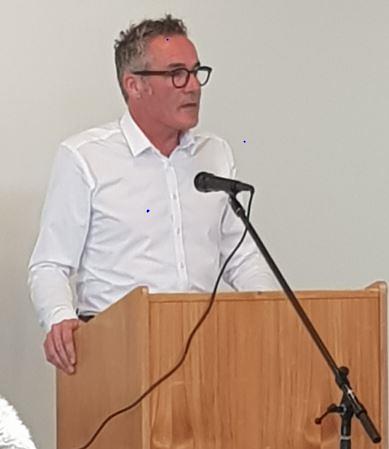The New Zealand Spinal Trust

Hans Wouters gave us a unique insight into the wide range of support the NZST provides for individuals and their families when faced with spinal injuries.
Coming from a background in advertising, Hans has been working for the last 7 years with the Trust as it developed and grew the range of support services it provides.
In helping demonstrate how spinal injuries can be life changing, Hans asked us: “Is breaking your neck a fate worse than death?”
Three New Zealanders a week experience a spinal injury where things change in a split second. This is where the NZST kicks in to support individuals and their families.
Professor Alan Clarke, the Dean of the School of Medicine, began the Trust in 1994 following undergoing rehab after suffering a back injury. The ongoing work of the Trust as it grew has significantly reduced the risk of spinal injuries which includes, as an example, a dramatic drop in scrum injuries.
The Trust’s vision is:”All New Zealanders with spinal injuries will be supported”. A guiding principle is that patients need to be in charge of their rehabilitation in order to regain their independence.
The Trust has been in action 25 years and serves all New Zealanders regardless of their rehabilitation stage including when they are back in the community. They have 18 paid staff at Burwood and Auckland Spinal RehabilitationUnits.
What is life like when dealing with a spinal injury? We were shown a video of Amanda who is a tetra with damage to the upper back. She found that the biggest change was getting back into the community.
What helped Amanda included taking up wheelchair rugby and getting back into the water which she found normalising, and she is now in the Para Olympic Squad for swimming.
The Trust offers 3 types of support: (1) Vocational rehabilitation (2) Peer support for both patients and family members, and (3) a Library Centre.
Prior to vocational rehabilitation only one in ten returned to work. This has now increased to 7 out of 10 returning to meaningful paid or unpaid work. A key component of this success is helping patients build “hope” in unravelling what their future is in order to create a meaningful life.
In addition to a Central Library that helps provide key information, the Trust also provides a book titled “Back On Track” which educates patients with what they face and what will be most useful in helping them move forward.
Hans shared that a spinal injury has multiple effects and asked the question: “If you could have one thing back what is it?” Most people think it is to be able to walk again, but this is seldom mentioned.
More common answers from those with spinal injuries include (1) knowiung when their bladder is full, (2) being able to get up, dressed, and go in less than 2 hours etc.
The Trust publishes another book, Head Space, which targets those who also have a brain injury. It is written in a way that is simple to read and non-stimulatory. This is viewed as a crucial resource by other support organisations working in this space.
The Trust also produces regular stories in magazines and their website, www.nzst.org.nz has a wide range of resources as well.
With respect to the nature of spinal injuries in New Zealand, 67% are traumatic and the remainder non traumatic. Hans then asked: “What do you think are the major causes of spinal injuries?”
We did pick the main 3 but not in the correct order. They are as follows: (1) car crashes 23%, (2) sports injuries (28%), and the most common cause (3) falls 36%.
In terms of funding the Trust receives 17% from the public sector and 80% from donations or grants. They actively promotes Fundraiser Fun via the slogan: “Do something you love” which can be viewed on www.nzstfun.org.nz.
The Trust views that the best way to recover is to get your mind in a place of possibility, hope and options.
The session concluded with a short video of Mary who shared how crucial the support from the NZST was in helping her become as normal as she could be going forward.